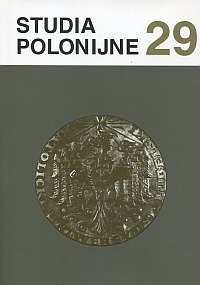Opieka duszpasterska nad Polakami w Szwecji
Main Article Content
Abstrakt
The beginning of emigration of Poles to Sweden goes back to the second half of the 19th century, but nowhere did they live in tight centers. Only some of them, mainly manual workers, made up small groups. Since they were dispersed it was hard for them to develop mutual relations and organized forms of religious and national life. In parishes where Poles lived pastoral work was usually conducted by Redemptorists from the Dutch province.
Rev. Wilhelm Meijerink, a Dutchman from the Order of Jesus’ Heart, pioneered pastoral care for Poles (in Oskarström). In 1928 Primate A. Hlond sent Little Servant Sisters of the Immaculate Conception of the Blessed Virgin Mary of Pleszew to take care of the Polish emigration. Since 1930 the Salesians undertook to take care of pastorate in Sweden, also taking care of Poles. The first Polish priest who started performing pastoral duties permanently (in Malmö) was Rev. Stefan Wullert of S´ roda Wielkopolska.
At the request of Apostolic Curate Bishop J. E. Müller, in 1945 Polish Military Bishop Józef Gawlina sent to Sweden four military chaplains, ex-prisoners of the Nazi concentration camps: Czesław Chmielewski (of the Łomża Diocese), Jan Przydacz (of the Włocławek Diocese), Bronisław Szymanski (of the Łomża Diocese) and Józef Taczała. In 1953 on the strength of the papal constitution Exsul Familia the Polish Catholic Mission (PMK) in Sweden was established, whose office was in Malmö, with Rev. Czesław Chmielewski appointed as its Rector.
In 1966 the Oblates assumed the pastoral duties; in 1967 – the Salesians; in 1972 – the Passionists and the Paulists; in 1987 – the Capuchins; and in 1990 – the Conventual Franciscans. Since on 1st April Rev. Czesław Chmielewski, the Rector of the PMK in Sweden, retired, Rev. Bogdan Wagnerowski, a Salesian, became the head of the Polish pastorate in Stockholm. The Ordinary of the Stockholm Diocese, Bishop Hubertus Brandenburg, seizing the opportunity, effected changes in the structure of the PMK. Three centers of the PMK were established in Malmö, Göteborg and Stockholm. They are still working according to different rules. The Stockholm center as an organization is independent of parish structures, jurisdictionally it is subject to the Bishop Ordinary, and territorially it is subject to the parishes on whose area the pastorate is conducted. The two other centers of Polish pastorate were included in the parishes in which they were working. Polish pastorate is conducted by seven monastic priests according to the formula missio sine cura animarum.
In Sweden about one third of the working clergymen are Poles (51 out of 150 Catholic priests working in Sweden are Polish). In Sweden there are no Polish churches, chapels or parish homes (also other nations do not have them); Polish pastorate has been conducted in Swedish churches, or even in private houses. Hence to a large degree it is traveling pastorate. However, Poles do not constitute a closed community and on most Sundays they take part in the liturgy of the Swedish Catholic Church – with small exceptions (Stockholm, Malmö, Göteborg, Landskrone) – and they also use the services of the parish clergy.

